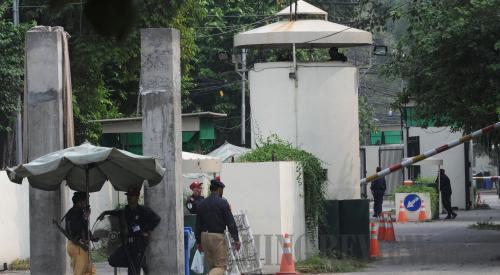|
 |
|
ON GUARD: Pakistani security personnel stand guard outside the U.S. consulate in Lahore, Pakistan on August 5. The United States evacuated all non-emergency staff from the city on August 9, citing "specific threats" amid a worldwide alert over Al-Qaeda intercepts (XINHUA/AFP) |

The United States temporarily closed 21 U.S. embassies and consulates in the Middle East and Africa on August 2 after a warning about a possible Al-Qaeda terrorist attack. Shortly afterwards, Britain, Germany and France announced two-day closings of their embassies in Yemen. While the reason for the embassy closings remains controversial, it is undeniable that the United States and its European allies are still facing serious terror threats from the Middle East and Africa. As U.S. strategy seeks to shrink counter-terrorism in anticipation of a post-war on terror era by withdrawing troops from Afghanistan, the United States might face more serious national security challenges in the future.
Terrorist threats rising
Western media reported that the embassy closings were tied to U.S. intelligence about an Al-Qaeda terror plot against diplomatic posts in the Middle East and some other Muslim countries. Nasir al Wuhayshi, Yemeni head of Al-Qaeda in the Arabian Peninsula, was recently identified as the number two leader of the terror network. Wuhayshi is a close contact of top Al-Qaeda leader Ayman al Zawahiri, and was ordered to attack the United States. As the United States was not able to immediately determine the exact time and targets of the plot, Washington issued the unprecedented order to close more than 20 embassies and consulates in the region.
Historically, the Middle East and North Africa have been a hotbed for terrorist activities. In the 1980s, Osama bin Laden set up the base for a "jihadi training camp" in Yemen. Afterward, bin Laden settled in Sudan with his Al-Qaeda organization. Around the same time, Zawahiri established his Islamic Jihad organization in Egypt, dedicated his efforts to overthrowing Egypt's Hosni Mubarak administration. After September 11 of 2001, South Asia became the center of terrorist activities. Settled in the tribal areas of Afghanistan and Pakistan, Al-Qaeda has attracted terrorists worldwide to the region, somewhat easing the conflict in the Middle East and Africa. However, with the increase of anti-terrorism efforts from the United States and Pakistan in recent years, especially after the shooting of bin Laden, the Al-Qaeda headquarters in South Asia was heavily battered. Terrorists were forced to flee back to their home countries, including the Middle East and Africa. In addition, the so-called Arab Spring movement also provided terrorists with a greater space for illicit activities. Al-Qaeda and its related organizations have tried to profit from troubled situation, once again ratcheting up terrorist activities in the Middle East and Africa. Countries in the region including Yemen, Mali, Syria, Iraq and Libya have again become havens for international terrorists.
In Yemen, taking advantage of the security vacuum left by the regime change, a branch of Al-Qaeda was set up in the Arabian Peninsula, furthering its reach in tribal areas in the southern part of the country. It provides the local population with power, food, water as well as medical services, aiming to strengthen its ties with locals through economic support. The Al-Qaeda branch had once founded an Islamic emirate in the region, constantly launching strikes against U.S. targets. It also published an English-language online magazine named Inspire, which became an important tool for inciting international and domestic extremists to carry out attacks and major threats against the United States. The explosive devices used during the U.S. Boston Marathon bombings on April 15 were made with instructions in the online magazine.
In Mali, the Movement for Unity and Jihad in West Africa, Al-Qaeda North African branch and Ansar Dine were able to seize the northern part of the country, seeking to impose sharia law in areas under their control. Though they were suppressed by France and the West African Economic Community, they retreated to mountainous regions to continue suicide attacks and other tactics of guerrilla warfare. Their bomb attack threats also spread to surrounding countries. The hostage crisis in Algeria in January and the French embassy bombing in Libya in April were all connected with them.
After the overthrow of Muammar Gaddafi, many terrorists gathered in Libya and grabbed large amounts of weapons from the arsenal of the former Gaddafi regime. They formed many new armed terrorist forces. Libya also became a new base to export extremism in the region. The killing of the U.S. ambassador to Libya also showed the severity of terrorism in the country.
The security situation in Iraq sharply deteriorated following the troop withdrawal of the United States. Media reports said that about 1,000 people were killed in terrorist attacks in the month of July alone. The Al-Qaeda branch in Iraq also sends terrorists to Syria to train new employees, providing funds and weapons to Syrian terrorist organizations.
|
